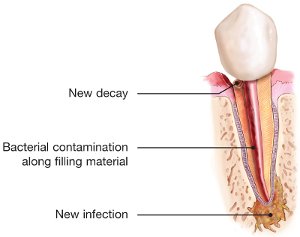
Get treatment for all your Endodontic needs.
What is Endodontics?
Endodontics is a specialized branch of dentistry focused on diagnosing and treating issues related to the tooth’s pulp and tissues surrounding the root of the tooth. As an Endodontist, I specialize and am highly trained in complex procedures ranging from root canal treatment to apicoectomies. This expertise is crucial in offering the best chances to save teeth that may otherwise be extracted and in need of replacement.
An endodontist is most concerned with the pulp of a tooth. The pulp is the innermost part of the tooth, consisting of soft tissue, nerves, blood vessels, and connective tissue. Though critical in development, a fully mature tooth can survive without the pulp. Deep decay, trauma, or cracks can cause the pulp to become inflamed or infected, causing severe pain and leading to an abscess if left untreated. An endodontist treats these issues by removing these tissues, disinfecting the canals, and sealing off the tooth. This way, the natural tooth can be perserved without need of extraction and a potentially expensive implant.
Our services
Root Canal Treatment
A non-surgical treatment to save a tooth that is badly infected or decayed. The infected pulp is removed and the root canal system is thoroughly disinfected and sealed. Root canal therapy involves local anesthesia and is often completed in two visits depending on the treatment required. Success for this type of treatment occurs in about 90% of cases.
Apicoectomy
A surgical treatment typically performed when a retreatment or prior root canal fails, and infection remains at the apex of a root. A small incision is made in the gum tissue to access the underlying bone and remove the infected root. The end of the root is then sealed and the incision closed. The procedure is often considered a last ditch effort to save the tooth from extraction.
Retreatment
A non-surgical procedure performed when a previously treated root canal fails to heal properly or becomes re-infected. The tooth is re-opened, the prior filling is removed, and the canals are disinfected. In some cases, additional canals are discovered and treated, giving the tooth the best prognosis. All the canals are filled and sealed, helping save the tooth and prevent extraction.
Traumatic Injuries
An injury is first assessed to review the extent of the damage to the tooth and surrounding tissues. If fractured, I may perform a root canal to remove damaged pulp and protect the tooth. For teeth displaced or knocked out, I can reposition and stabilize the tooth and perform a root canal if necessary. This treatment is given in hopes of preserving the natural tooth while restoring its function.
“I still can't believe I'm saying this, but my root canal was an entirely pleasant, pain-free and very good experience! Who would have thought that a root canal could be a "good experience?" That just goes to show you how exceptional Dr. Jimenez is.”
— Previous patient, 2022






